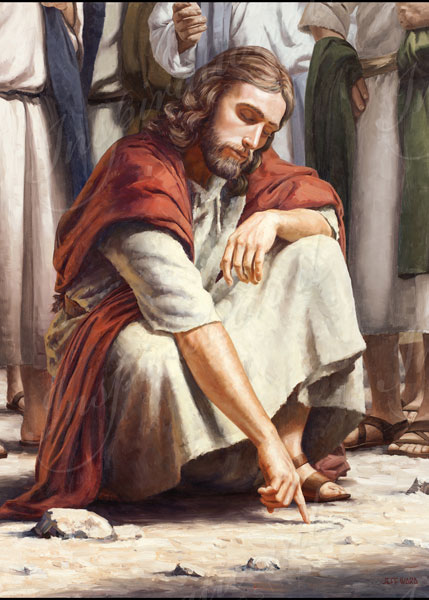
ATTEMPTS TO ARREST JESUS;
HYPOCRISY REBUKED.
WHEN the chief priests and the Pharisees heard that many of the people believed on Jesus and were speaking in his praise, they sent officers to take him. But Jesus kept right on teaching; and said, "Yet a little while I am with you, and then I go unto Him that sent me. Ye shall seek me and shall not find me; and where I am, thither ye cannot come." Then the Jews began to wonder what he meant by this saying, thinking that perhaps he intended to go among the Greeks, and teach them.
The last day of the feast was considered the greatest, and on that day, when the largest number of people were present, Jesus stood and cried, "If any man thirst, let him come unto me, and drink." Then spoke of the influences of the Holy Spirit, which should be given to all who believe on him, and which should be a never-failing source of comfort and refreshing. In speaking of this, he uses the same figure that he had used while instructing the woman of Samaria at the well of Jacob, comparing the Spirit's influence to a well of “living" water springing up unto everlasting life.
'Many of the people therefore, when they heard this saying, said, Of a truth this is the Prophet. Others said, This is the Christ. But some said, Shall Christ come out of Galilee? Hath not the Scripture said that Christ cometh of the seed of David, and out of the town of Bethlehem where David was? So there was a division among the people because of him.
And some of them would have taken him. Then the officers returned unto the chief priest and the Pharisees who had sent them there to take Jesus; and when they were asked why they had not brought him, they said "Never man spake like this man." Then said the Pharisees, ''Are ye also deceived, Have any of the rulers or of the Pharisee believed on him?"
They claimed that the common people who believed on Jesus, were so ignorant as to be easily deceived; and seemed to think that the curse of God would rest upon them for not following their leaders. But Nicodemus, the same that came to Jesus by night, said, "Doth our law judge any man before it hear him, and know what he doeth." But they said, "Art thou also of Galilee? Search, and look: for out of Galilee ariseth no prophet."
At night, the people went to their houses or rather to their booths, but Jesus retired to the Mount of Olives. In the morning, when Jesus returned to the tern pie, the Jews brought before him a woman whom they accused of breaking the seventh commandment; saying, "Moses in the law commanded us that such should be stoned, but what sayest thou?" This they did in the hope of finding an accusation against him; for if he decided that the woman should go free, they would charge him with disregarding the law of Moses; andif he decided that she should be stoned, they would accuse him to the Romans, who claimed the sole right of inflicting capital punishment.
"But Jesus stooped down, and with his finger wrote on the ground, as though he heard them not. So when they continued asking him, he lifted up himself, and said unto them, He that is without sin among you, let him first cast a stone at her. And again he stooped down, and wrote on the ground."
The woman's accusers, conscience-smitten at the words of Jesus, "went out one by one, beginning at the eldest, even unto the last; and Jesus was left alone, and the woman standing in the midst.
"When Jesus had lifted up himself, and saw none but the woman, he said unto her, Woman, where are those thine accusers? hath no man condemned thee? She said, No man, Lord. And Jesus said unto her, Neither do I condemn thee; go, and sin no more."